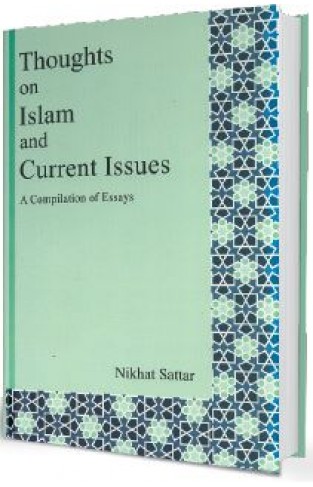Thoughts on Islam and Current Issues
Thoughts on Islam and Current Issues
By:
-
Rs 1,270.75
- Rs 1,495.00
- Ex Tax :Rs 1,270.75
- Price in loyalty points :1500
You saved Rs 224.25.
Due to constant currency fluctuation, prices are subject to change with or without notice.
easoned senior writer and columnist Nikhat Sattar has compiled her diverse essays on the complex topic of Islam in this elegant volume published by Pakistan Publishing House. Sattar’s main aim is clear: to present her personal view of Islam to the audience as a religion that is not simply valuable and wise but one with which she has developed a close personal affinity over the years. Her spiritualism informs several of the shorter pieces in the first two-thirds of the text; towards the latter portion she engages in a lengthy and concentrated explication of the generally misunderstood and misused Islamic injunction regarding domestic violence against women.
It does not take a rocket scientist to figure out that Sattar’s views are often subversively and occasionally openly feminist. But the strength and beauty of the volume does not lie just in the fact that she is writing from the perspective of a Muslim woman. She exhibits a true humanitarianism in commenting on how the true spirit of Islam promotes self-sacrifice, submission to the will of Allah, a necessity to be aware of and help combat the problems of the hungry and underprivileged, and even demonstrates a strong sense of civic sense. Her essay on Hajj is an eye-opener, because while she was as emotionally moved to be performing the pilgrimage as any devout Muslim is, she pulls no punches when it comes to describing how aggressive and uncivilized people can socially become even while performing what is expected to be a peaceful communion with the soul of the Kabaa. Indeed, a greater sense of peace pervades her essay on her childhood in Chittagong as opposed to her comments on the frenzied activities of some during Hajj.
It goes without question that Sattar’s knowledge of the Holy Quran is sound and her work is informed by a familiarity with several strong Hadith as well as the work of notable Islamic scholars such as Tariq Ramadan, among others. She is not as unmitigated a feminist as the likes of Fatima Mernissi and takes issue with the fact that some extreme feminists have radically criticized Islam by basing their writings on more shaky Hadith than those she uses herself. However, what is admirable is that instead of simply ranting and raving about social injustices such as child marriage, the oppression of the girl-child, rape and domestic violence, she tries to approach an analysis of tensions, such as those arising between the genders (especially marital tensions) in a relatively measured fashion.
At least three times over the course of her book she quotes the lovely Quranic verse that indicates that men and women are garments for each other to be worn with pride. While she condemns the activities of extreme movements such as Daesh and ISIS, she rightly notes that unbalanced interpretation of Islam as opposed to measured tafsir lies at the heart of much of the wrongful violence committed in the name of her religion today. She even notes perceptively that had 9-11 not taken place, Islamophobia would still, alas, have found other outlets with which to express itself in the world.
She examines the work of several scholars and clerics when it comes to addressing issues such as a woman’s ostracization by a man within the confines of marriage. She obviously does not approve personally of a husband’s exercising the right to beat his wife, but fair-mindedly notes that Islam stresses that marriage should be a partnership based on kindness and tolerance, and that even divorce should only be used as a last resort, once all means to resolve marital differences amicably have been exhausted. She professes deep reverence for the Prophet Mohammed (PBUH) and I was pleasantly surprised to observe that she quotes from Western individuals such as Washington Irving when describing what a truly noble and excellent individual he was. She also demonstrates considerable respect for the just Hazrat Umar as well, a point that is implicitly alluded to not only by her making note of some of his personal good deeds, but also by her essay on the Quran as a justice-oriented Furqan, criterion of rules. Though I scanned the book many times, I was slightly surprised to find no major mention of either Hazrat Ali or Karbala — perhaps the author can amend this omission in a later edition.
In spite of the historical and classic base of much of her writing, parts of the text are very modern and indeed pertinent to world affairs today. She expresses dismay at the terror that the current pandemic has struck into the hearts of many, and believes firmly in using Islamic teachings related to goodwill and solidarity as a universal panacea to help combat such global tensions. Although sour-faced detractors might scoff and say that the book is lightweight compared to more erudite (and more interesting) texts, Nikhat Sattar should nevertheless be commended for crusading blithely through some stressful times and themes in order to actively demonstrate to the world that she is proud to be a Muslim












